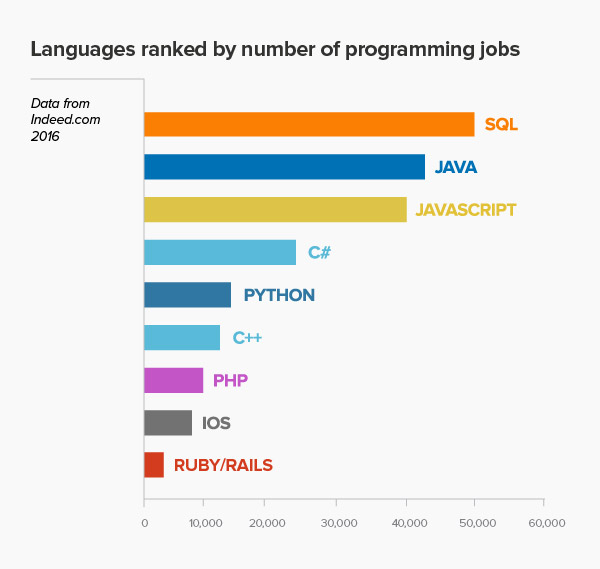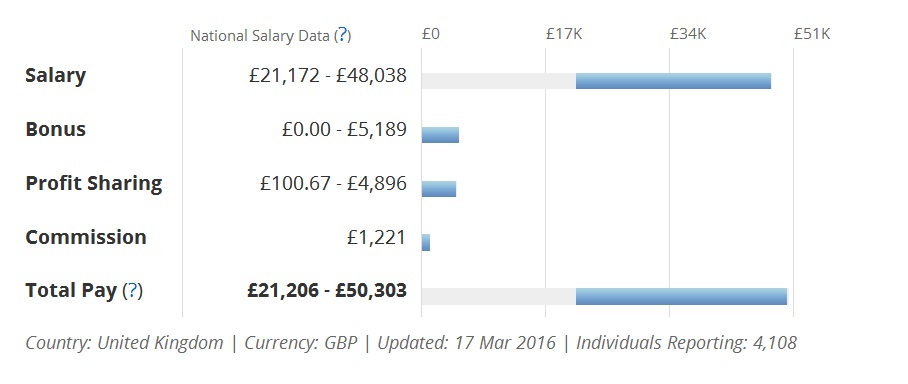How can you find new career opportunities? Welcome to the latest news from TalkIT. This follows on from the:
April Newsletter on the professional certifications available for developers
June Newsletter on how TalkIT can help you learn to code online.
Contents
Looking for new career opportunities?
Which Programming Language?
Career Options
What the Agencies Say
What the Employers Say
Can You Solve This Coding Problem?
Other Bits
Looking for new career opportunities?
TalkIT works with a global audience, including the USA, the UK, India and South Africa. Many of our clients want to increase their employability. Their questions concern job roles, job hunting and salaries. They also want to know what languages are used in the software industry. Over the last 3 years TalkIT has published many blogs that answer these questions. This newsletter looks deeper into the career choices that are available today.
Which Programming Language?
People often ask us which language to learn first. If you are interested in a high earning career you may learn a popular programming language. But deciding where to start can be difficult.
The May 2015 Newsletter looked at the differences between programming languages.
“The creation of new languages is due to emerging trends from software research, like Object Orientation. The rapid growth of the Internet also created opportunities for new languages. Programming language evolution continues, in both industry and research.
Each language is designed to be better at specific tasks. For example JavaScript works well for client-side web development.”
TalkIT provides full courses in the main industry languages: Java, C#, C++, HTML, ASP.Net MVC and Python.
Here are the figures for 2016. I found it interesting that Java is back in second place. It was initially released 20 years ago. Source: http://www.codingdojo.com/blog/9-most-in-demand-programming-languages-of-2016/
Career Options
Software drives the world. There is an enormous demand currently for capable software developers. In many countries there are simply not enough experienced developers for planned projects. This means there are lots of potential career options. The April Newsletter looked at what programmers do for a living.
“There are various programming specializations such as:
- Analyst Programmer: This includes a high-level of design and analysis.
- Communications Programmer (Systems): this includes telecommunication infrastructures or network programming.
- Database Programmer (Systems): this includes designing, querying and maintaining databases.
- Information Technology Manager: this includes planning, administering and reviewing different computer and telecommunication systems.
- Multimedia Programmer: this includes text, graphics, video, animation etc.”
Despite the demand for developers, finding the right job is still tough. There are many recruitment agencies and websites that can help. Many agencies specialise in IT recruitment. Even though these do not have a great reputation, used wisely agencies can save a lot of time. Their job is to match the candidate with the appropriate role.
DeveloperSalary
One you have signed up with an agency, they will arrange the job interviews. These can include a test or questions in the relevant language. It’s a good idea to ask in advance what the interview will include. Preparation is crucial. There are many ways to improve your chances of getting a job offer.
The question of salary will probably come up during you job interview. How much do software developers typically earn?
A Software Developer earns an average salary of £30,633 per year in the UK in 2016. The total salary can include bonuses and profit sharing.
Source : http://www.payscale.com/research/UK/Job=Software_Developer/Salary
What the Agencies Say
Xist4 is a Bristol based IT recruitment agency. We asked them about the IT job marketplace.
What educational background do your candidates have?
A lot have university experience and beyond but some positions are willing to accept those without a degree. Creative coders and UI/UX designers are assessed more on their portfolios while support/infrastructure positions favour those with strong IT education.
What coding languages or technologies are most in demand with your clients?
A recent study from Indeed shows that SQL, Java, JavaScript and C# are hot skills to have right now.
How many years experience in the required job skills do your candidates have?
Varies once again; some people are straight out of school/university while others have decades in the industry – each opening varies greatly depending on the requirement.
What are typical salaries for developers, senior developers and project managers, etc. that your clients offer?
Greatly varies depending on various factors; the length of experience, the location of the role and the company’s budget themselves – London will always pay more for any IT individual as that is the biggest technology hub in Europe at this moment. As an example; I know junior coders who earn £20k in Cardiff but can earn £40k for the same responsibilities in London!.
What are the job roles your clients want to fill?
Anything within IT and technology; development, networking, support, QA, Project Management… just to name a few!
How much on-going training and support for developers do your clients provide?
Some expect people to hit the ground running with no supervision whilst others are put through long training processes to develop their skills. The IT dev community as a whole like to share ideas and skills with each other using online forums and meet-ups. They’re a friendly bunch who likes to help each other out
What the Employers Say
Mayden provides innovative cloud based software for the healthcare industry. They found it so difficult to find developers that they started their own academy. We asked them about their apprenticeships. These often lead to a job offer.
What educational background do your candidates have?
A wide range of backgrounds, our minimum requirement is 2 A levels (or equivalent qualification), but we get applications from a wide range of people, recent A level graduate, people with multiple PHD’s and everyone in-between.
What coding languages or technologies do you cover during the apprenticeship?
We spend most of the time teaching general programming principals and techniques rather than specific languages, this gives our students a better grounding to build their career on. We also teach a lot of the “soft skills” required to be a developer, such as Agile Scrum.
What are typical salaries for your apprentices, developers, senior developers and project managers, etc?
Most of our Academy students do not receive a salary as it is a paid for course. We do have some trainee positions on the course who receive a minimum wage however. Our average graduate receives around £20,000.
How much on-going training and support do you provide for developers?
We have extremely comprehensive training available for all our developers, we have multiple online subscriptions to video tutorial websites, and all developers have access to a variety of technical and non technical training. In addition, developers have the option to attend on average 2 c0nferences a year.
What are the most important characteristics you look for in a potential apprentice?
The biggest thing we are looking for is enthusiasm and passion for technology and programming. You don’t have to have any experience with coding but if you can show a proven interest in code, ideally having started to teach yourself the basics.
Can You Solve This Coding Problem?
Just predict the output of these statements without executing the code. If you need some help, check our C# course. Write your answer in the comments below. Or add your own puzzle.
//Puzzle with Conditionals
int k = -10, l = 30;
if (k <= l)
{
if (l >= -k)
{
Console.WriteLine(k+l);
if (k+l <= 20)
{
Console.WriteLine(l/ k);
}
}
}
Console.ReadLine();
Other Bits
TalkIT has been very active on social media recently. We have been posting on coding, new gadgets and IT humour. Why don’t you connect with us on Twitter or FaceBook? You can follow all the latest news and let us know what you think. Here are some recent tweets.
What can you earn as developer? Learn industry standard coding languages. https://www.talk-it.biz
Confused by coding jargon? Try TalkIT’s C# jargon buster. https://www.talk-it.biz/training/tutorials/jargon-buster
Confused by coding jargon? Try TalkIT’s Java jargon buster. https://www.talk-it.biz/training/tutorials/java-jargon-buster
How to improve personal effectiveness … manage your time & task list? http://www.talk-it.biz/2014/02/talk-itfebruary-newsletter
SQL Server Business Intelligence course Bath 5 day 26/9/16 BOOK NOW discount http://ow.ly/uwze300DXN6
Learn to code with TalkIT – 100+ tutorials 200+ videos 400+ hrs content http://www.talk-it.biz
What makes a good programmer? Is it talent, education or experience? http://www.talk-it.biz/2014/01/january-newsletter/
Time for a Career Opportunity? Learn to code online when & where you want. http://www.talk-it.biz .
Photos www.freedigitalphotos.net/
Thanks to Mayden Academy
http://www.maydenacademy.co.uk/
And Xist4 Recruitment
David Ringsell TalkIT 2016 ©




